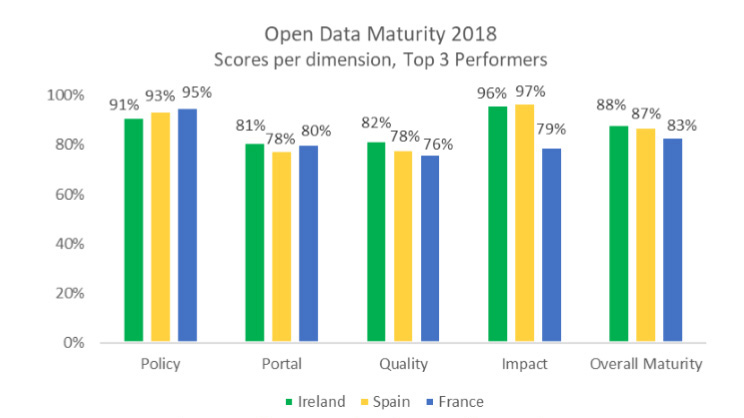The European Data Portal considers Spain as a model for good practices in open data
Fecha de la noticia: 29-05-2019

The European Data Portal (EDP) has just published the Analytical Report 13: Open Data best practices in Europe's Top Performers, where it analyses the open data strategy of the leading countries in this area in Europe: Ireland, Spain and France. These are the 3 countries that obtained the highest score in the last EDP maturity Landscaping.
The purpose of this new report is to be used as a guide for those countries that are developing or want to improve their open data project. For this purpose, the report describes the common success factors that have allowed the three countries analysed to become trend-setter on open data.
The report is based on the 4 dimensions used by the EDP in its latest maturity landscaping: Policy, Portal, Quality and Impact. Dimensions where Spain obtained a great result, as the following graph shows.

Let´s see in detail the conclusions of each section.
Dimension 1: Policy
The key factors that Ireland, Spain and France share are:
- A strategic vision around open data, grounded in a comprehensive policy framework. All three countries analysed have is a state-level policy that drives a common vision of open data. In the case of Spain, the report highlights the role of the Aporta Initiative as a common framework that drives the ecosystem of open data in the country. The document also highlights the creation of two specific plans aimed at promoting coordination among different agencies: the “Digital Transformation Plan for the General Administration and Public Agencies 2015-2020", which foresees actions for the publication of information for citizens and businesses and fostering of its re-use, and the "Digital Plan" of 2013, where the objective is to simplify the conditions for re-using public sector information. In addition, Spain is an example of overcoming barriers related to complex federal structures, thanks to a framework that favours the coordination of different government levels (national, regional and local) for the development and implementation of local open data initiatives.
- An inclusive open data governance structure. Ireland, Spain and France have understood the need to launch an inclusive and participatory process, where the needs of the different actors are taken into account. Through different activities (such as working groups, events or seminars), publishers, re-users or society members in general can share their vision of the open data ecosystem. Among other actions, the report highlights the collaborative and interoperable platform launched by A Coruña, Madrid, Santiago de Compostela and Zaragoza under the umbrella of the Ciudadesabiertas.es project.
Dimension 2: Portal
In this dimension, the report analyses the scope and mission of national open data portals. All three portals are not a mere repository for metadata records, but have become virtual spaces for knowledge development, exchange and interaction on open data. In particular, the three countries have in common:
- Advanced features that foster access to data, and enable interaction between users. All portals include tools that facilitate interaction between publishers and re-users. For example, in France and Spain, users have the possibility of providing comments to each data set, and including new data or use cases in the corresponding sections. The report also highlights the usefulness of dashboards to obtain statistics on key performance indices and analyse data impact.
- Access to data, tools and editorial content. It is not surprising that one of the key functions of a national open data portal is to enable access to all open data published across the country. But it should also provide materials and editorial content on relevant topics aimed at a broad audience, including publishers and re-users from all sectors, as well as the general public. In the case of Spain, the Spanish portal provides separate sections for open data reports, news, events, interviews, etc.
Dimension 3: Impact
The key aspects to take into account in this dimension are:
- Strategic awareness around fostering, monitoring and measuring open data reuse. All three portals provide good examples of use cases to demonstrate the reuse of open data on each of the sectoral dimensions assessed by the European Data Portal: political, social and environmental as well as studies that focus on assessing the economic impact of open data. The report also highlights how the implementation of seminars, events or contests, such as Aporta Meetings or Aporta Challenges, can help boost the reuse of open data in the country.
- Focus on developing data ecosystems in thematical domains. Ireland, Spain or France boost the publication and reuse of open data in specific sectors. Last year, Spain focused on the economic and innovative value of data, a topic that started 2018 Aporta Meeting and the Infomediary Sector Report of ASEDIE. France also focused on the business sector, as well as transport and geographic data, while Ireland has opted to create a series of events, called "Open Data Impact Series", focused every time in a different sector.
Dimension 4: Quality
The differentiating elements in this dimension are:
- Ensuring discoverability and regular updating of open data stemming from local, regional and national sources.
- Monitoring the quality of and fostering better open data publication in the country
This is provided by a mix of automated harvesting and manual editing of metadata records. Additionally, backend mechanisms (such as validators) as well as documentation (such as guidelines or support centres that provide help to publishers) were set up,
The implementation of all these actions enabled Ireland, Spain and France to secure top positions in the European Data Portal assessment, but also, and more importantly, to foster a sustainable transformation of open data ecosystem in the country.
These key elements can be used to develop a checklist to guide next steps of national policy makers and open data portal managers. However, as any best practice, each country needs to assess the transferability and applicability to their individual context and adopt a tailored approach that ensures the response to their specific needs.











